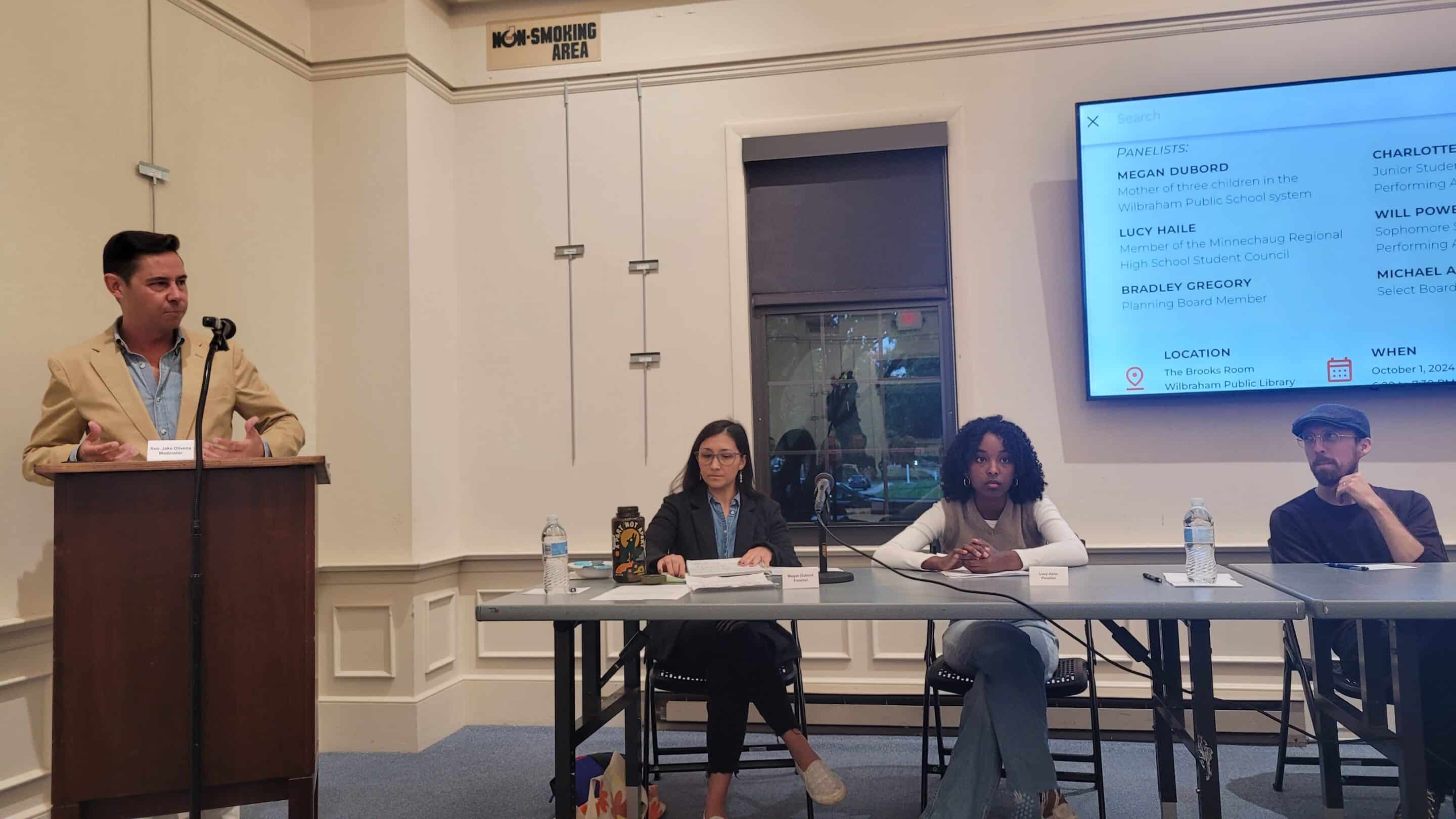State Sen. Jacob Oliviera speaks with Wilbraham residents about ways to increase voter turnout while moderating the Wilbraham Democratic Committee’s “Aspirations of Wilbraham’s Young Generation” panel discussion on Oct. 1.
Reminder Publishing photo by Laura Mason
WILBRAHAM — On Oct. 1, six Wilbraham residents gathered for a panel discussion at Wilbraham Public Library, focusing on topics of youth engagement and voter challenges.
The “Aspirations of Wilbraham’s Young Generation” panel was sponsored by the Wilbraham Democratic Committee and moderated by state Sen. Jacob Oliviera (D-Ludlow). It featured six residents, who represented a diversity of ages and positions within the town.
The panelists were Wilbraham mother, textile artist and Democratic Town Committee member Megan Dubord; Minnechaug Regional High School class of 2027 President Lucy Haile; Planning Board member, father and new Wilbraham resident Bradley Gregory; Pioneer Valley Performing Arts Charter Public School junior Charlotte Powell; Pioneer Valley Performing Arts Charter Public School sophomore Will Powell; and Select Board member, father and social worker Michael Squindo.
One topic that was discussed at the panel was how to increase involvement in local politics as well as engagement specifically from Wilbraham youth.
When asked about why young people were less involved in politics, Charlotte Powell noted the “overwhelming” nature of politics, stating that college students she’d spoken with had expressed concerns about the amount of pressure in selecting government representation. She encouraged making the process “less scary” and providing more guidance for youth. Similarly, Dubord stated that more discussions with young people was needed to clarify information about voting.
Will, Haile and Gregory each touched on their personal experiences of becoming more involved. Haile discussed her experience of becoming involved in school government, describing how she was inspired to run for the student council due to her older sister’s prior involvement, while Gregory stated that simply asking others in town “what do you need to get involved?” and attending meetings on issues that he cared about was a good first step. Will highlighted his participation in standout events as an introduction to his own involvement.
Squindo noted that it was important for residents to remember that local officials are simply other residents who were elected to the position. He encouraged fellow residents to talk with peers about “what they know” as a first step.
The panel also focused on how to increase voter turnout, highlighting potential ways to make voting more approachable for residents, including remote town meetings, voting on Saturdays and lowering the voter age.
Dubord emphasized the importance of “meet[ing] people where they are at,” noting that poor availability of information or resident’s individual needs may make voting more challenging. She discussed her personal experience becoming involved as a mother of three school-aged children, stating that “it is challenging” but supports like offered childcare and focusing on her personal motivation as a mother helped her involvement.
Gregory noted that mail-in ballots can be helpful for families with young children interested in voting. When asked about the possibility of remote town meetings, Squindo stated that alternative options for voting does increase turnout but that concerns of fairness and security also needed to be addressed with these options. In response, Dubord suggested additional support options for residents, such as providing the opportunity to use a town van for residents who are interested in attending meetings but unable to drive at night.
Concerning lowering the voting age to 16, Charlotte Powell spoke in favor of this change, explaining that students would be able to receive the needed education to vote through school. Alternatively, Will suggested that 16-year-olds only be able to vote in certain applicable, local elections, such as for the School Committee, while Haile voiced that 16-year-olds would not have enough to time research in order to be fully informed for voting at that age due to focus on studies.
Following the panel discussion, Wilbraham Democratic Town Committee chair Christine Goonan thanked the panelists and Oliviera for their involvement and support of the discussion. “We are hopeful for the next generation,” she emphasized, stating that she hoped that the town would “grow to be the Wilbraham that I know we can be.”
Democratic Town Committee member Idalí Torres, who helped to organize the panel event, was also recognized by Goonan and Oliviera.



